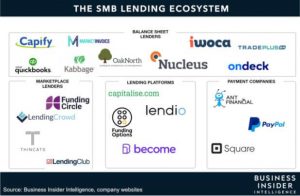
The 10 Biggest Fintech Stories of 2019
2019 was quite the year for Fintech, so what happened? Here we sum it up nicely for you, just in case you missed something.
The industry is unrecognizable from what it was just a decade ago and as we look back over the last year it seemed to be all about partnerships. In our eyes, some of the biggest fintech stories (especially when it comes to the lending sector) were the following…
1. The rise… and fall of Libra
Facebook revealed the details of its cryptocurrency Libra back in June 2019, allowing for the transfer of money and purchasing of goods with nearly zero fees. October saw things take a turn for the worst as the currency was heavily scrutinized by regulators and lawmakers over data-use concerns. This lead to PayPal Visa, Mastercard, eBay and Stripe quitting the Libra initiative. It’s still unclear what the future holds for Libra, but it certainly serves as a cautionary tale of what could go wrong when big companies try to pave their way in the unfamiliar (to them) fintech space.
2. FIS acquires Worldpay for $34bn
This mother of deals was 2019’s biggest acquisition. The merge paired Fidelity National, one of the largest issuer processors with Worldpay, one of the largest merchant processors. Let’s see what 2020 brings to these giants.
3. $0 trading commissions
Investing in stocks is now more accessible than ever before. Commission fees at major brokerages dropped to a big fat zero, allowing investors to buy and sell stocks FREE of charge. Fintech startup Robinhood has had this offering for a few years now, but Square began offering bitcoin trading and free stock trades on its Cash App just earlier this year. Charles Schwab Corporation also made waves when they became the first brokerage to offer $0 trades in October. Within a matter of days, others began to follow suit, including Fidelity, E*Trade Financial, TD Ameritrade and more.
4. Apple Inc released a new credit card
Apple took a giant leap into the financial services market in August 2019, teaming up with Goldman Sachs to launch a new credit card, Apple Pay. This is an example of yet another service moving away from traditional banks. The question remains, is Apple Pay really the future of payments or is there something Apple isn’t telling you about its new credit card? Apple’s been tight-lipped about its performance since the launch, we’ll just have to keep an eye on it in 2020…

5. A new breed of banks
It’s not just Apple. Some of the world’s biggest tech companies are braving unknown territory, developing unlikely banking products and giving Fintechs a run for their money in 2020. Google announced it’s new project code-named ‘Cache’, in partnership with Citi, that’s set to offer checking accounts to consumers in 2020. Asides from Facebook’s Libra, Uber is also testing the waters with Uber Money going after digital payments. More and more companies are squeezing financial services into their products, who knows what the 2020’s will give rise to.
6. JPMorgan Chase ends business loan partnership with OnDeck
Fintech is evolving at an unprecedented rate, and as Fintechs grasp at a new era in banking, it’s clear that partnerships are needed, the question remains how to make them work. A survey by Become (formerly Lending Express) in April 2019 discovered that nearly 50% of 1,000+ small business owners surveyed believed that technology is critical to the lending process. While Fintechs have advanced solutions, financial institutions have brand and scale on their side.
Despite sounding like a match made in heaven, partnering up may not be so simple, something evident when JPMorgan Chase ended their 3-year partnership with renowned online lender OnDeck. Banks and Fintechs may have common goals, but their methods and culture couldn’t be more opposite. OnDeck has sought to use the JPMorgan partnership as “the foundation of a separate business unit that provides technology to banks.” We’ll just have to wait for 2020 to see what they mean by that.
7. A surge in partnerships and collaborations
The Fintech industry is becoming no stranger to rebundling its services and partnerships are becoming accepted as the norm. In fact, a survey by Finextra found that 81% of banking executives see working with partners as the best path to digital transformation.
2019 saw numerous collaborations between innovative payment solutions and banks, for example, the UK’s established OakNorth bank with Monzo and MoneyBox. Then there are the smaller partnerships between seemingly unlikely pairings such as alternative lender Kabbage and domain registrar GoDaddy. These pairings have been driven by a few factors, namely, scalability, costs and innovation of customer experience.

No one quite knows what the future holds for partnerships (especially after watching the partnership between JPMorgan Chase and OnDeck crumble) but collaboration, in our eyes, is certainly needed to benefit all parties and keep the industry moving forward.
8. Fundbox raises $326 million
According to CB Insights, one of Become’s very own lending partners, Fundbox, was amongst the top six biggest fintech deals in 2019. Fundbox currently supplies a credit line to approximately 200,000 small and medium-sized businesses in the U.S. This immense founding round highlights the need for alternative lenders in the current business lending space.
9. Payments giant Stripe debuts a credit card
Seems like everyone in 2019 was jumping on the credit card bandwagon. There are now so many credit card options it’s tricky knowing where to look first. Payments giant Stripe debuted their corporate cards (visa) for business customers, conveniently naming it the ‘Stripe Corporate Card’. Users pay the balance in full each month with no interest or fees (for now).
10. Small business loan trends are shifting to alternative lenders
Alternative lenders are continuing to grow in the banking industry causing more traditional banks to digitize their own lending options. According to Business Insider Intelligence’s SMB Lending Report, “if incumbents don’t explore technology advancements, alt lenders could begin taking a larger share of the market.”
[bctt tweet=”We predict that 2020 will see the business lending space shift further towards lending platforms and alternative financial institutions when it comes to #BusinessFunding” username=”Become_co”]
We predict that 2020 will see the business lending space shift further towards lending platforms and alternative financial institutions when it comes to business loans. Far too many small businesses (58% to be precise) are left either unable to qualify or waiting too long for more traditional bank loans.
 (Spot us if you can!)
(Spot us if you can!)
As we enter the 2020’s, it’s hard to imagine what the next decade will bring but we are confident that the lending space will continue to innovate, transform and make the world of Fintech an easier one to navigate.





